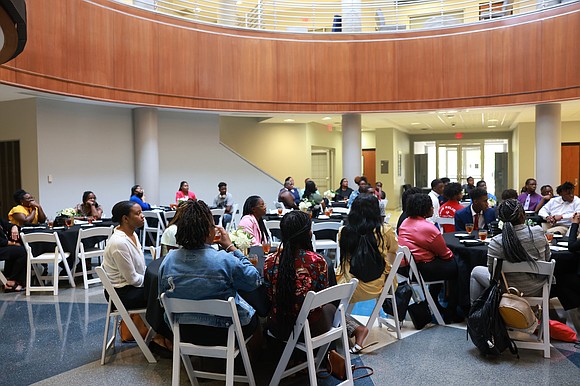Summer Programs Return to the Jackson State University College of Business
Style Magazine Newswire | 6/28/2022, 5:31 p.m.
The Jackson State University College of Business welcomed high school and middle school students to campus for Uncovering the Possibilities of Accounting Careers (UPAC) and Financial Wellness Center summer programs in the month of June.
“These programs help us build relationships with high school and middle school students,” said the Dean of the College of Business, Fidelis Ikem, Ph.D. “They get to see what the college offers. They get to see the resources the college has, so when it comes time to make a decision about where they are going to college, we hope they will choose us.”
The Financial Literacy Summer Camp is the first of its kind hosted by the university’s new Financial Wellness Center. The UPAC program was sponsored by Deloitte, a multinational professional service company, that donated tens of thousands of dollars to make the summer program possible. Due to the Covid-19 pandemic, the College of Business temporarily suspended the UPAC high school summer residency program.
“At the firm, we think it’s very important to invest in our youth, especially minority youth. We understand that people come from different backgrounds and we want them to have an equal opportunity to potentially join our firm and give them knowledge that they may not have had about what we as accountants do each and every day,” said Clarencia Taylor, CPA, a Deloitte representative. “There’s not a lot of minorities in the space right now, but if we continue to do more outreach, we can build a pipeline for minority students as they graduate.”
Nineteen high school students from various parts of the state moved to JSU’s campus for the week-long UPAC program. The campers had the opportunity to reside in a college setting for six days and five nights and attend classes on accounting and college preparation.
Participants also met several JSU alums with successful careers in accounting. Camp director Lori Liddell-Jackson, CPA, says the camp’s goal is to increase the understanding of accounting and highlight career opportunities among high school minority youths in public and private school systems.
“Research has found that a lot of reasons why there is a very low number of minority students to pursue an accounting profession is because they don’t know anything about it and all the possibilities of a career in accounting,” said Liddell-Jackson. “This program exposes them to more niche accounting as opposed to just a general business program.”
During the summer program, the students were divided into teams to participate in a case study competition. The campers were required to think like a real accountant and analyze an assigned retailer from a holistic point of view. They also explored financial statements, how the company operates as business, and how it stands up against its competitors.
Financial Literacy Can Change Lives
The Financial Wellness Center Summer Camp was a three-day boot camp that introduced financial literacy to middle school students. The young scholars learned about the banking industry, generational wealth, budgeting, saving, and investing from financial experts.
“The main objective is to provide them with some initial and basic financial literacy skills to give them a head start on their financial journey but, overall, we want to promote generational wealth. We want to give them those keys and tools so when they get older, they’ll know how to generate wealth,” explained Financial Wellness Oversight Professor Candias Maiden, CPA.
During the financial literacy camp, students were taught how to create a budget template and how a credit score works. They were also introduced to investing and how to diversify and build an investment portfolio to increase net worth and provide a financial legacy for the next generation.
The inaugural Financial Wellness Center Summer Camp was sponsored by the Society for Financial Education and Professional Development (SFE&PD) and Wells Fargo. The two donors stressed the importance of learning financial literacy at an early age.
“If they start early, they can get out of the habit of just spending and learn alternative uses for money. You can use it for investment purposes, saving, and accumulating money to buy a house and start a business. Things come to play if you understand how money can be used,” explained Theodore Daniels, founder and president of SFE&PD.
Daniels pointed out that the median net worth of the average African-American household in America is less than $17,000 as opposed to a white household that has $171,000 and financial literacy knowledge aims to change this.
“I believe the earlier you start the better off you are. We’re very excited at Wells Fargo to be a part of this not only in our sponsorship but our involvement here with Jackson State University,” said Mike Ryan, district manager for Wells Fargo.




